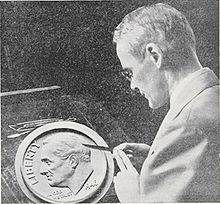John R. Sinnock: Difference between revisions
Nikkimaria (talk | contribs) rm EL |
→History: add ref on military decorations |
||
| Line 53: | Line 53: | ||
==History== |
==History== |
||
Sinnock was the designer of the [[Roosevelt dime]] and [[Franklin half dollar]], among other U.S. coins. His initials can be found at the base of the Roosevelt and Franklin busts. He also sculpted, although did not design, the [[Purple Heart]] medal, the [[Yangtze Service Medal]], and various other medals and commemorative coins. |
Sinnock was the designer of the [[Roosevelt dime]] and [[Franklin half dollar]], among other U.S. coins. His initials can be found at the base of the Roosevelt and Franklin busts. He also sculpted, although did not design, the second (and current) form of the [[Distinguished Service Cross (United States)|Distinguished Service Cross]], the [[Purple Heart]] medal,<ref>{{cite book|title = Medals for Soldiers and Airmen: Awards and Decorations of the United States Army and Air Force|first = Fred L.|last = Borch III|authorlink = Fred Borch|publisher = [[McFarland & Company|McFarland]]|year = 2013|isbn = 9780786474127|chapter = Distinguished Service Cross|chapter-url = https://books.google.com/books?id=9Hv6St9HxmYC&pg=PA30|pages = 30-42}}</ref> the [[Yangtze Service Medal]], and various other medals and commemorative coins. |
||
Sinnock was born July 8, 1888, in [[Raton, New Mexico]], and was educated at the [[Philadelphia Museum School of Industrial Art]]. He won the A.W. Mifflin Award for study abroad. Sinnock was well-traveled. His longtime confidante was Margaret Campbell, who inherited much of his artwork as well as his personal collection of materials related to the development of the Roosevelt Dime. |
Sinnock was born July 8, 1888, in [[Raton, New Mexico]], and was educated at the [[Philadelphia Museum School of Industrial Art]]. He won the A.W. Mifflin Award for study abroad. Sinnock was well-traveled. His longtime confidante was Margaret Campbell, who inherited much of his artwork as well as his personal collection of materials related to the development of the Roosevelt Dime. |
||
Revision as of 22:26, 28 August 2021
John Sinnock | |
|---|---|
 Sinnock at work on plaster model of Roosevelt dime | |
| 8th Chief Engraver of the U.S. Mint | |
| In office 1925–1947 | |
| Preceded by | George T. Morgan |
| Succeeded by | Gilroy Roberts |
| Personal details | |
| Born | John Ray Sinnock July 8, 1888 Raton, New Mexico, United States |
| Died | May 14, 1947 (aged 58) Staten Island, New York, US |
| Spouse(s) | Jennie Alice (nee Peart), 1893-1968; m. 1914 |
John Ray Sinnock (July 8, 1888 – May 14, 1947) was the eighth Chief Engraver of the United States Mint from 1925 to 1947.
| Dime engraved by John Sinnock | |
|---|---|

| |
| Obverse: Portrait of Franklin D. Roosevelt, year and US national motto (In God we trust). | Reverse: E pluribus unum, olive branch, torch and oak branch surrounded with face value and lettering "United States of America". |
| Total 86,408,282,060 coins minted from 1965 to 2015. | |
History
Sinnock was the designer of the Roosevelt dime and Franklin half dollar, among other U.S. coins. His initials can be found at the base of the Roosevelt and Franklin busts. He also sculpted, although did not design, the second (and current) form of the Distinguished Service Cross, the Purple Heart medal,[1] the Yangtze Service Medal, and various other medals and commemorative coins.
Sinnock was born July 8, 1888, in Raton, New Mexico, and was educated at the Philadelphia Museum School of Industrial Art. He won the A.W. Mifflin Award for study abroad. Sinnock was well-traveled. His longtime confidante was Margaret Campbell, who inherited much of his artwork as well as his personal collection of materials related to the development of the Roosevelt Dime.
For ten years, Sinnock was an art instructor at both his alma mater and at Western Reserve University. He was appointed Assistant Engraver and Medallist at the Philadelphia Mint in 1917 before becoming the Chief Engraver in 1925.[2]
Controversies
Upon the initial minting of the Roosevelt dime in 1946, a false narrative arose in the United States that the letters "JS" actually stood not for John Sinnock, but for Joseph Stalin. The urban folk story coincided with the Second Red Scare. The rumor surfaced again after the release of the Sinnock designed Franklin half dollar in 1948.[3]
Another controversy that surrounded the Roosevelt dime following its public release was an allegation that Sinnock copied or borrowed the design of the President's profile from a bronze bas relief created by sculptor Selma H. Burke for the dime's obverse. Sinnock denied this claim and said that the obverse portrait of the President was a composite of two studies which he made from life in 1933 and 1934. Sinnock said that he also consulted photographs of FDR and had the advice and criticism of two prominent sculptors who specialize in work in relief, however it is now widely accepted that he was influenced heavily by Burke's bas relief.[4]
See also
References
- ^ Borch III, Fred L. (2013). "Distinguished Service Cross". Medals for Soldiers and Airmen: Awards and Decorations of the United States Army and Air Force. McFarland. pp. 30–42. ISBN 9780786474127.
- ^ "John R. Sinnock, Coin Designer". The Numismatic Scrapbook Magazine: 260. March 15, 1946.
- ^ "Stalin for Dime". Snopes.com. Retrieved 2011-10-22.
- ^ "John R. Sinnock, Coin Designer". The Numismatic Scrapbook Magazine: 261. March 15, 1946.
External links
